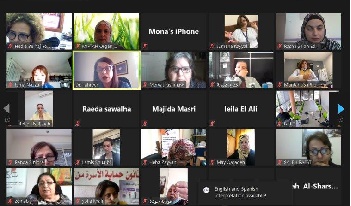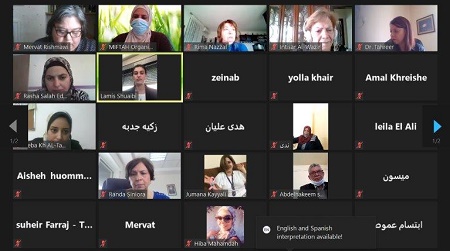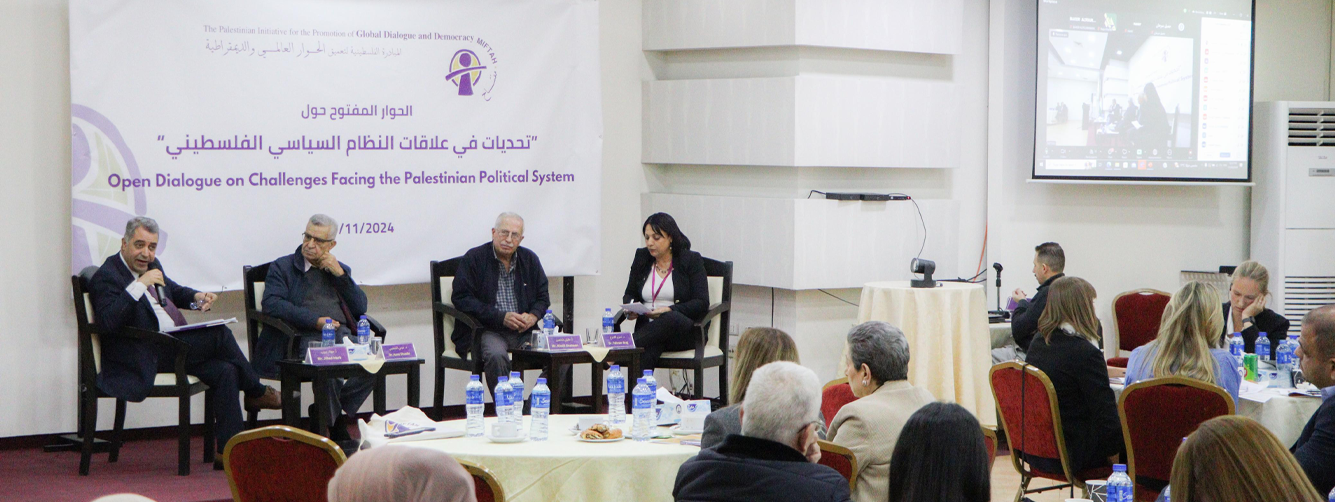
Ramallah – On November 11, MIFTAH, in partnership with the Women’s Coalition for UNSCR 1325 and the General Union of Palestinian Women, launched its 2021-2024 second generation strategic lobbying and advocacy plan as part of MIFTAH’s efforts to promote the Women Peace and Security agenda in Palestine. The launching of this strategy is supported by OXFAM and the Norwegian Representative Office, coincides with the 20th anniversary of UNSCR 1325 and is in honor of the National Day of Palestinian Women.
In her opening speech, MIFTAH Executive Director Dr. Tahreer Araj said the launching of the second generation lobbying and advocacy plan is part of MIFTAH’s efforts to promote the Women Peace and Security agenda in Palestine to achieve justice for Palestinian women to live in freedom and dignity and to end the occupation. She explained the significance of the plan given the critical political period the Palestinian cause is experiencing in that it reflects a national, resistance program including the dimension of Palestinian women living under occupation, siege, in exile and in places of refuge. Araj also said it reflected the importance of employing international rights mechanisms given the absence of any political will to implement international resolutions that hold Israel accountable for its crimes and violations.
Meanwhile, Intisar Wazir, head of the GUPW, commended MIFTAH’s efforts towards implementation of Resolution 1325 and the development of an advocacy strategy in this regard. She said, “UNSCR 1325 gives us a glimmer of hope for holding accountable those who commit crimes against the Palestinian people and not to allow them impunity. It also calls for intensified efforts to expose Israel’s brutal policies.”
She continued, “In our previous plans, we focused on raising the awareness of the women’s base to Resolution 1325, which we did for around 150 cadres and institutions belonging to the Women Coalition for Resolution 1325. In addition, we focused on documenting the occupation’s violations through a women’s lens. At this stage, we are interested in advocacy and lobbying, within a broader framework with MIFTAH’s participation, through the use of international tools.”
Meanwhile, Ms. Leila Chedid, representative of the Norwegian Representative Office to the PA reaffirmed that their long cooperation with MIFTAH is a major component of peace and security in Palestine. She expressed her appreciation for the efforts MIFTAH made in order to promote this agenda in spite of the many challenges facing those overseeing this plan. “Palestine is one of our focal countries for our WPS-work - and as an elected member of the Security Council for 2021-2022, Norway is dedicated to moving WPS-agenda higher up on the global agenda, by integrating it into all the Council’s work. Moreover, we will continue to be an outspoken defender of international law – at the Security Council and elsewhere - including international humanitarian and human rights law.”
OXFAM country director Mr. Shane Stevenson said in his presentation: “Palestine is considered an advanced country in the MENA region to adopt and implement the WPS agenda, as it was the second country to develop and adopt the NAP after Iraq. However, the situation in oPt remains a unique context not just in the region but also globally, which gives the WPS agenda a unique experience and view while addressing the occupation impact on women and girls.”
He went on to say: “The UNSCR 1325 Women’s Coalition strategic advocacy plan 2021-2024 is an important document that reflects the vision, demands, and rights of Palestinian women and girls and in the diaspora, and opens up the space for civil society organizations to have a unified vision that upholds women and girl’s rights under occupation.”
Stevenson continued that the advocacy strategy plan will also give space for the Women’s Coalition to promote accountability at the national and international levels and to increase the ability to combat impunity and promote women’s participation in national reconciliation and decision-making in the various bodies, in addition to holding international parties accountable for their obligations and responsibilities in protecting Palestinian women and girls.
Furthermore, the Women’s Coalition for Resolution 1325 coordinator, Rima Nazzal said the preparation of the advocacy strategy was distinguished by the wider circle of consultations around it in the West Bank and Gaza Strip and with women outside the homeland. There was also participation from a group of expert Arab women regarding their own countries’ preparation of similar national plans (NAP). Meanwhile, the lobbying efforts revolved around two points: political participation and accountability with a focus on the ethical dimension, through building alliances with Arab and international networks.
Strategy plan framework
Consultant Rasha Salah Eddin then presented the 2021-2024 strategic framework for the plan, which was based on a process of broad consultations including a MIFTAH field study. The study included over 200 Palestinian women from the West Bank, Gaza Strip, Jordan and Lebanon in addition to interviews with representatives from the women’s movement in these regions and from the GUPW in Syria.
The plan was also based on the Palestinian women’s vision for UNSCR1325, stemming from the right of the Palestinian people to end the Israeli occupation and to establish an independent Palestinian state on all lands occupied in 1967. This also includes guaranteeing the rights of Palestinian women in all locations, including the right to determine their own fate. In addition, this includes an analysis of the historical Palestinian atmosphere surrounding the colonialist settler occupation and analysis of the issues pertaining to the occupation’s ongoing policies and violations regarding the resolution.
Meanwhile, the plan’s strategic framework was based on the achievements of the coalition, its institutions and members at previous stages, which included raising Palestinian awareness on Resolution 1325, applying pressure in international platforms to hold the occupation accountable and prevent impunity and pressing for women’s participation and inclusion of the women’s vision in national reconciliation.
Strategic objectives
The strategic objectives of the plan revolve around four focal points:
One: accountability of the occupation for its violations of human rights law and international humanitarian law including war crimes and crimes against humanity against the Palestinian people.
Two: participation: the Israeli occupation of Palestinian land is considered the root cause of the violation of Palestinian women’s security and rights because of the socioeconomic impacts of its racist policies and direct measures on the ground.
Three: protection: Since the occupation of Palestine, Palestinian women have been subject to multiple patterns of violations, which threaten their human security.
Four: prevention and ways of developing means of protection for women against further violations, beginning with early warnings at the international level
In her intervention, international expert Mirvat Rishmawi said the strategy was directed at advocating for Palestinian women in all locations to guarantee the protection of their rights, first and foremost human security. It is also aimed at setting relevant international laws into motion, including resolutions related to the right to self-determination and return. Rishmawi said the goal was to garner support for the strategy and its accompanying action plan on the basis of the linkage between the four focal points of the WPS agenda (accountability, participation, protection and prevention); the need to activate accountability of the occupation and ensure it does not have impunity for its crimes at the various levels, through lobbying the international community using international tools and platforms and supporting national efforts based on international law.
Furthermore, Zeinab Ghuneimi, director of the Center for Women’s Legal Research and Consulting, stressed that the strategy should include a demand to end the siege on the Gaza Strip. She held the occupation responsible for encouraging the internal division and attempting to derail reconciliation efforts by preventing travel between the West Bank and Gaza and obstructing access to basic services and goods.
Amal Khreisheh meanwhile, said the vision reflected in the strategy added a vital dimension to UNSCR1325. “The strategy clearly confirmed how Resolution 1325 and other related resolutions can be utilized in the process of resistance to dismantle the colonialist, Zionist project,” she maintained, including promoting women’s role in this resistance. She continued that the Palestinian cause is in a dangerous phase because of Israel’s settlement and Judaization policies and the absence of international will to hold the occupation to account or to prevent impunity for countries that import weapons to Israel.
Interventions
The meeting included several interventions, which all confirmed that the occupation is the main obstacle to implementing the strategic plan in the Gaza Strip. They also called for: the need to include the term “occupation” in UNSCR1325 to make it easier to hold Israel accountable; demand international protection for the Palestinian people; document the Israeli occupation’s violations; work on broadening the scope of participation for young men and women; focus on the role of the media in spreading awareness on Resolution 1325, especially social media by using creative and innovative tools to spread this awareness; to collectively use available international platforms and tools; work to collectively amplify women’s voices on all issues important to them; reaffirm the link between the national and social struggle; consider the plan a strategic framework for all Palestinian women inside the homeland and in the Diaspora; and stress on the importance of the struggle on the ground as the basis for action and as part of the international mechanism towards change.
The participants also pointed out the political opportunity today to focus on building up women’s solidarity, especially in the United States and especially among women who can influence American discourse on the Palestinian cause.
The meeting was closed by Lamis Shuaibi, MIFTAH’s Policy Dialogue and Good Governance Director who stressed on the importance of continued efforts to launch such strategies based on national issues. She pointed to the ability of the Women’s Coalition to launch advocacy and lobbying strategies that would give more weight to the international community and to the coalition’s ability to be more interactive at the international level to shift the resolution from condemnation to execution. She also called for linking all relevant resolutions to a clear Palestinian women’s vision and for highlighting the points of the strategic plan pertaining to Palestinian refugee women, maintaining that what sets the plan apart from others is its broader participation.
Shuaibi also stressed on the need for action after the strategic plan is launched, saying more consultation with supportive international institutions was necessary. In addition, she called for more discussion over the tools and mechanisms needed to implement the plan and to coordinate between international and Palestinian rights institutions, stressing on the importance of youth participation in international digital campaigns.
Meanwhile, MIFTAH project manager, Najwa Sandouka-Yaghi cited the broad participation from international institutions and women activists at the international and regional levels and from civil society institutions in addition to a broad sample of Palestinian women from Palestine and the diaspora. These women, she explained, took part in developing the strategic approaches for the second generation lobbying and advocacy plan, which includes the 2021 executive plan and which is considered part of MIFTAH’s ongoing support for the WPS agenda through its various programs.










